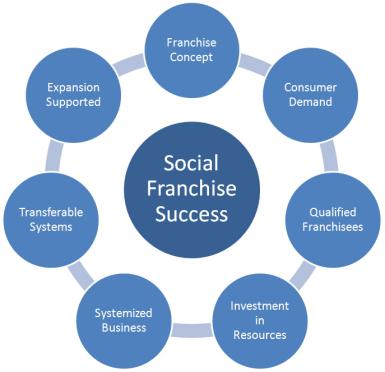Franchising, retail, business

03/08/2015
The promise of social franchising to deliver sustainable solutions to society’s social needs is grounded in the fundamental principles that have made franchising such a successful replication model in the commercial sector.
Unfortunately, most social franchise implementers are not familiar enough with those principles to optimize franchising’s potential. This article is intended to shed light on the key conditions that all implementers should be aware of when designing or striving to improve a social franchise.
It will also be useful for funders of social franchisors to be aware of these conditions so that their investments are supporting best practices and driving the field of social franchising toward a more impactful and sustainable future.
Conditions Required for a Social Franchise to Succeed
Social franchising will deliver results, just like commercial franchising delivers results, when certain conditions are in place. These are:
When all of these conditions are in place, it is safe to conclude that the concept is franchisable.
The next step would then be to design the franchise.
Elements of Good Social Franchise Design
Once the groundwork for success is laid by creating the conditions described above, the franchise can be designed. Following are some key elements of all good franchise designs that should be addressed when designing or strengthening a social franchise system.
Mechanisms to enable franchisees to meet those standards
The franchisor’s role is to support franchisees in meeting the franchise brand standards. Mechanisms used to support franchisees include standardized business systems and operations manuals, supply channels, training, marketing, and routine communications and site visits from franchise field staff. Franchisees expect this type of support from the franchisor. Without it they would not be able to run the franchise business successfully, and both the franchisee and franchisor would fail.
Incentives for complying with standards
Social franchising works when business incentives are aligned with social mission. From the outset, the franchise must be designed so that franchisees benefit financially when the social mission is achieved. If they do not, the cost of following the franchise rules will be higher than the cost of losing the rights to the franchise business.
Mechanisms to monitor compliance with standards
Learning that standards are not being met through consumers is too late. The franchisor must have systems in place to monitor compliance with standards, and to proactively solve problems as they arise so that they do not become unmanageable.
Mechanisms to enforce compliance with standards
If there is neither benefit to complying nor risk for not complying, the franchisor will not have enough control over quality to deliver on the brand promise, which will eventually lead to its demise. The franchisor must be willing and able to exercise authority over franchisees when they do not comply with standards. More importantly, the franchisor should strive to maintain its value to franchisees in order to minimize incidence of noncompliance.
The franchise will more likely succeed when all of these elements are adequately addressed in the franchise design. If a franchise is underperforming, the franchisor should assess 1) whether all of these elements are addressed in the strategic plan; 2) whether the plan is being executed as intended; and 3) where adjustments could be made in each of these elements. Understanding good franchise design makes it easier to fix problems and make improvements to the system over time, because it provides levers for adjustment and feedback on the effectiveness of the adjustments.
Conclusion
Implementers and funders of social franchising will dramatically improve their bottom lines when they understand the fundamentals of franchising discussed in this article. There are experts in the field of franchising that can help with both design and execution of social franchises in the same way that they help commercial businesses. The International Franchise Association’s Social Sector Task Force has established a mentor program, and consulting firms like MSA Worldwide offer highly specialized technical support in social franchising. Whether a social business considering expansion through franchising, or an NGO that has been operating a franchise and is looking to improve its performance, there are resources available to help implementers make smart design decisions that will enable them to achieve social and financial goals. In the end, while many parties benefit from a well-designed social franchise, those who stand to benefit most are the people in need of the products and services being franchised. It behooves us all to make the effort to learn from each other so that we can better serve those in need and make this world a better place.
Fonte:http://franchises.about.com/od/Social-Sector-Franchising/fl/Fundamentals-of-Good-Social-Franchise-Design.htm?utm_source=exp_nl&utm_medium=email&utm_term=list_franchises&utm_campaign=list_franchises&utm_content=20150802